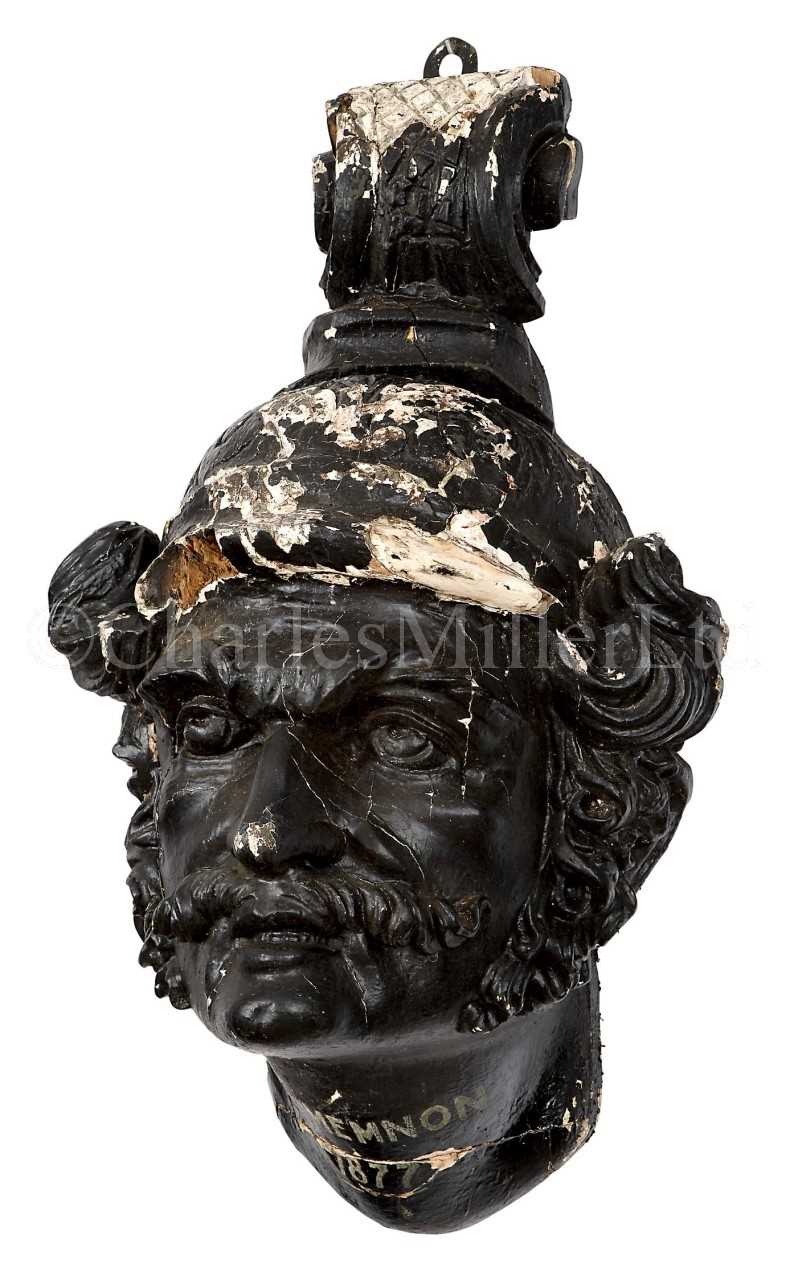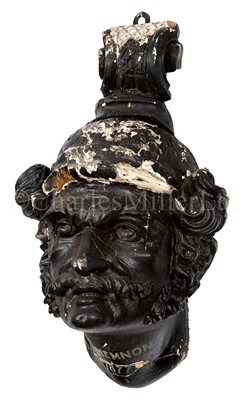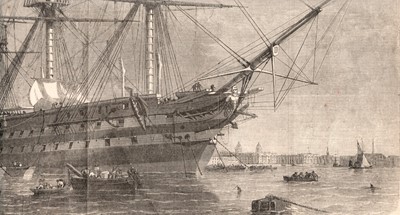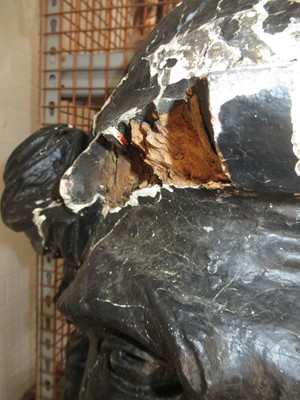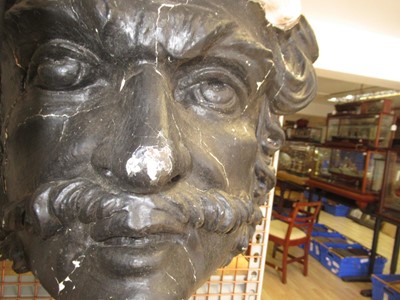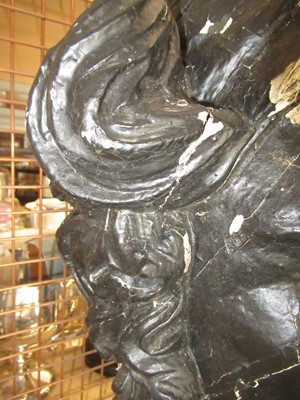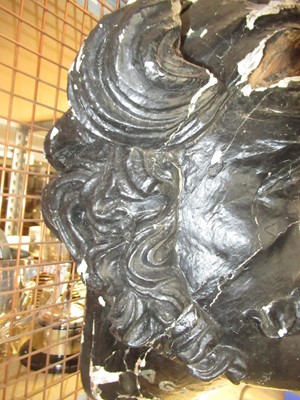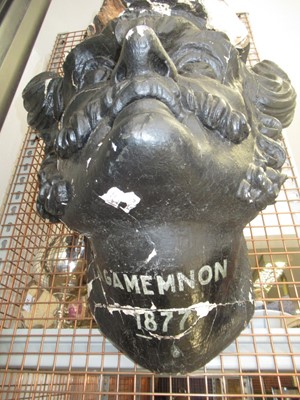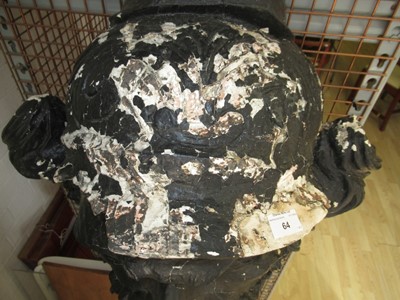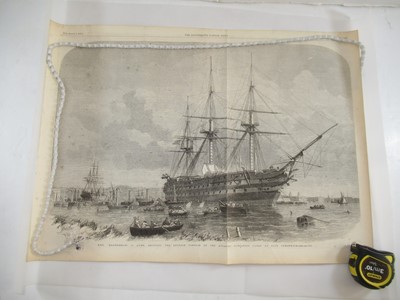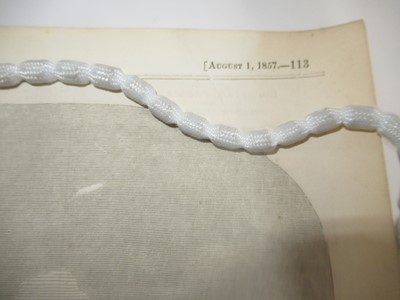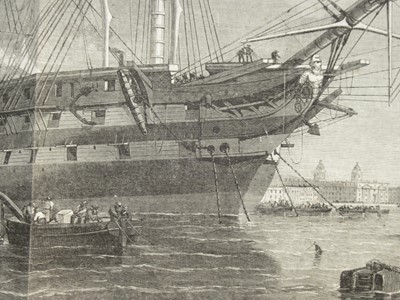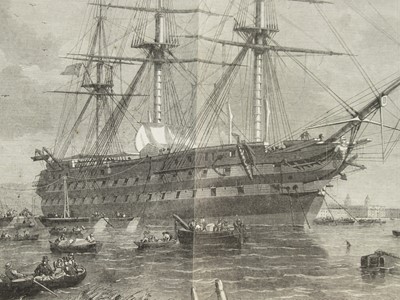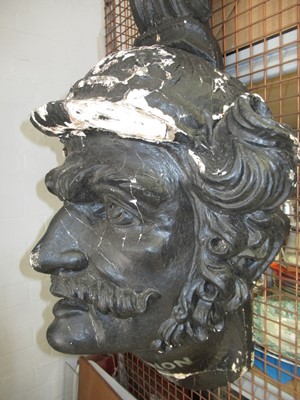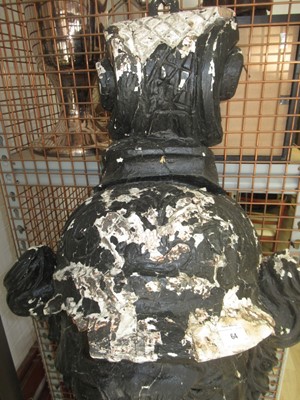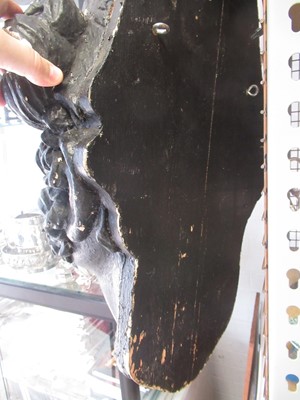1st Nov, 2022 10:00
Maritime and Scientific Models, Instruments & Art (Gloriana)
64
[M] THE HEAD OF H.M.S. AGAMEMNON'S FIGUREHEAD, HELLYER WORKSHOPS, CIRCA 1852
THE HEAD OF H.M.S. AGAMEMNON'S FIGUREHEAD, HELLYER WORKSHOPS, CIRCA 1852
carved as a moustachioed warrior wearing a plumed peak helmet with slightly open mouth, gesso covered overall, now ebonised, the neck inscribed AGAMEMNON / 1877 -- 36 x 20in. (91.5 x 51cm.); together with a 16 x 22in. engraving from the Illustrated London News date 1.8.57 entitled H.M.S. "AGAMEMNON", 91 GUNS, SHIPPING THE ENGLISH PORTION OF THE ATLANTIC SUBMARINE CABLE AT EAST GREENWICH. with good view of the vessel, including her bust-length figurehead.
(2)
Agamemnon (91), a 'James Watt'-Class battleship of 5,080 tons, had the distinction of being the first purpose-built auxiliary warship for the Royal Navy. Her success was such that she became the template for all RN auxiliary battleships for the decade after her launch in 1852. She served as flagship to Rear Admiral Mends in the Crimea and took part in the bombardment of Sevastopol in 1854 and the shelling of Fort Kinburn a year later. In 1857 she was fitted out to carry 1250 tons of telegraph cable for the Atlantic Telegraph Company's first attempt to lay a transatlantic telegraph cable. The first attempt was a failure, however, the next year she tried again and met her counterpart U.S.S. Niagara in mid-ocean, successfully splicing the cable ends on July 29th. Returning to Ireland with William Thompson (later Lord Kelvin) monitoring the 1,020 miles of cable, Agamemnon reached Valentia Bay on 5th August 1858 with Niagara raising Trinity Bay, Newfoundland the same day. Eleven days later Queen Victoria sent President Buchanan a ninety-nine-word message - a process that took over sixteen hours - which laid the foundation for all modern global communication thereafter. Agamemnon was paid off in 1862 and sold in 1870 -- her figurehead originally showed Agamemnon, Commander of the Greek Army at the siege of Troy in a plate-mail tunic and holding a scimitar and shield, Hellyer's charged £35/0/0 for the work.
Sold for £9,300
Estimated at £800 - £1,200
(inc. buyer's premium of 24%)
Condition Report
old wear and paint loss although seems to be mainly superficial and to the gesso/paint.
We are pleased to provide you with a general report of the condition of this property. Since we are not professional conservators or restorers, we urge you to consult with a restorer or conservator of your choice who will be better able to provide a detailed, professional report. Prospective buyers should inspect each lot to satisfy themselves as to condition and must understand that any statement made by Charles Miller Ltd is merely a subjective, qualified opinion. Prospective buyers should also refer to any Important Notices regarding this sale, which are printed in the Sale Catalogue. NOTWITHSTANDING THIS REPORT OR ANY DISCUSSIONS CONCERNING A LOT, ALL LOTS ARE OFFERED AND SOLD “AS IS” IN ACCORDANCE WITH THE CONDITIONS OF BUSINESS PRINTED IN THE SALE CATALOGUE.
THE HEAD OF H.M.S. AGAMEMNON'S FIGUREHEAD, HELLYER WORKSHOPS, CIRCA 1852
carved as a moustachioed warrior wearing a plumed peak helmet with slightly open mouth, gesso covered overall, now ebonised, the neck inscribed AGAMEMNON / 1877 -- 36 x 20in. (91.5 x 51cm.); together with a 16 x 22in. engraving from the Illustrated London News date 1.8.57 entitled H.M.S. "AGAMEMNON", 91 GUNS, SHIPPING THE ENGLISH PORTION OF THE ATLANTIC SUBMARINE CABLE AT EAST GREENWICH. with good view of the vessel, including her bust-length figurehead.
(2)
Agamemnon (91), a 'James Watt'-Class battleship of 5,080 tons, had the distinction of being the first purpose-built auxiliary warship for the Royal Navy. Her success was such that she became the template for all RN auxiliary battleships for the decade after her launch in 1852. She served as flagship to Rear Admiral Mends in the Crimea and took part in the bombardment of Sevastopol in 1854 and the shelling of Fort Kinburn a year later. In 1857 she was fitted out to carry 1250 tons of telegraph cable for the Atlantic Telegraph Company's first attempt to lay a transatlantic telegraph cable. The first attempt was a failure, however, the next year she tried again and met her counterpart U.S.S. Niagara in mid-ocean, successfully splicing the cable ends on July 29th. Returning to Ireland with William Thompson (later Lord Kelvin) monitoring the 1,020 miles of cable, Agamemnon reached Valentia Bay on 5th August 1858 with Niagara raising Trinity Bay, Newfoundland the same day. Eleven days later Queen Victoria sent President Buchanan a ninety-nine-word message - a process that took over sixteen hours - which laid the foundation for all modern global communication thereafter. Agamemnon was paid off in 1862 and sold in 1870 -- her figurehead originally showed Agamemnon, Commander of the Greek Army at the siege of Troy in a plate-mail tunic and holding a scimitar and shield, Hellyer's charged £35/0/0 for the work.
Auction: Maritime and Scientific Models, Instruments & Art (Gloriana), 1st Nov, 2022
Page turning catalogue here
Downloadable bid form here
Order of Sale:
Mercantile (Sail & Yachting) 1-57B
Mercantile (Steam) 58-112
Naval (Sail) 115-202
Naval (Steam) 205-319
Navigational & Scientific Instruments 325-353
You will not be able to bid in person for this sale, however, there are a number of ways you can still participate:
- Absentee bid – you can place a bid through your account on this website or download a bid form here
- Online via one of the following platforms:
UKAuctioneers: 3% surcharge or a flat-rate fee of £3.95. We will refund the flat-rate fee for successful bidders using the UK Auctioneers service
Invaluable: 5% surcharge
The Saleroom: 5% surcharge
We regret we are unable to offer telephone bidding for this sale
Shippers
Pack & Send (Spitalfields branch) / spitalfields@packsend.co.uk / Tel: +44 (0)20 7078 9860
Part & Parcel / shipping@partandparceluk.com / Tel: +44 (0)1252 545611
Alban Shipping / info@albanshipping.co.uk / Tel: +44 (0) 1582 493099
Simon Jones Superfreight / info@superfreight.co.uk / +44 (0)20 7924 3933
Viewing
Viewing by appointment - call +44 (0)20 7806 5530 or email enquiries@charlesmillerltd.com to book a slot.
